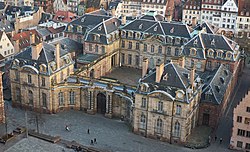This article includes a list of general references, but it lacks sufficient corresponding inline citations .(June 2023) |
The following is a timeline of the history of the city of Strasbourg, Alsace, France.
This article includes a list of general references, but it lacks sufficient corresponding inline citations .(June 2023) |
The following is a timeline of the history of the city of Strasbourg, Alsace, France.
| History of France |
|---|
 |
| Timeline |
| Topics |





Other cities in the Grand Est region:
Incunabula
This article incorporates information from the French Wikipedia.
{{cite book}}: |journal= ignored (help)